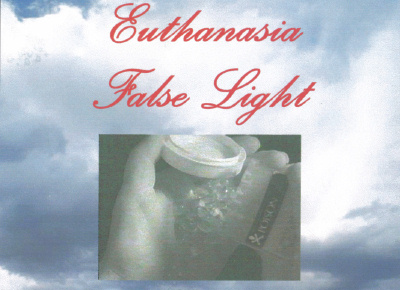Scroll down for articles
Current TN law regarding assisted suicide:
A person commits the offense of assisted suicide who:
Intentionally provides another person with the means by which such person directly and intentionally brings about such person’s death;
or
Intentionally participates in a physical act by which another person directly and intentionally brings about such person’s own death
and
Provides the means or participates in the physical act with actual knowledge that the other person intends to bring about such person’s own death; and the clear intent that the other person bring about such person’s own death.
Assisted suicide is a Class D felony.
and
Civil action for damages against any person who assists or attempts to assist suicide may also be brought.
Tenn. Code § 39-13-216 (a), (e), (f) & (g)
2017
A doctor-prescribed suicide bill, SB 1378, was proposed by Senator Tate.
A companion bill, HB 1394 was introduced by Representative Wirgau.
Representative Wirgau later wrote that he had made a mistake and withdrew his bill.
2015 – 2016
A doctor-prescribed suicide bill was considered in Tennessee but failed to pass in the 2015-2016 session.
Text and Analysis of “death with dignity” legislation proposed by Senator Tate.
Analysis of the 2015-2016 TN “death with dignity” legislation proposed by Senator Tate
This 154 word bill is an attempt to change Tennessee’s law prohibiting assisted suicide[1] to allow doctors to prescribe drugs intended to cause a patient’s death. Currently, in Tennessee assisted suicide is a felony.[2]
TEXT OF TN BILL:
AMEND Senate Bill No. 1362 House Bill No. 1040
by deleting all language after the enacting clause and substituting instead the following:
SECTION I. Tennessee Code Annotated, Section 39-13-216(b), is amended by adding
the following new subdivision (3) and renumbering existing subdivision (3) accordingly:
(3) Prescribes or dispenses medications for the purpose of aid-in-dying, which is
a medical practice that allows a licensed physician to prescribe a life-ending medication
to a mentally competent adult who:
(A) Has been a Tennessee resident for at least twelve (12) months;
(B) Is eighteen (18) years of age or older;
(C) Has been diagnosed by at least two (2) physicians as having a
terminal condition, as defined in § 32-11-103; and
(D) Has provided a written, notarized request for the medication, which
that adult may self-administer if and when that adult chooses; or
SECTION 2. This act shall take effect July 1, 2015, the public welfare requiring it.
Under the “death with dignity” bill:
A doctor would be able to prescribe a massive overdose of drugs for a person 18 year of age or older to take to end his or her life.
The bill would permit a doctor to prescribe or dispense “medications for the purpose of aid-in-dying.”[3] Many individuals erroneously assume that this means a patient would take “a pill” for that purpose.
According to the latest official report from Oregon, 99 % of prescriptions under that state’s “death with dignity” law were for either secobarbital or pentobarbital which are barbiturates (sedatives).[4]
The usual therapeutic dosage for each is 100-200 mg. The usual lethal dose prescribed for doctor-assisted suicide is up to100 times greater 9,000 to 10,000 mg.[5]
Individuals who could live for many years would be eligible for doctor-prescribed suicide.
Under the bill, doctors would be permitted to prescribe a lethal dose of drugs to patients who have been diagnosed as having a “terminal condition” which is so broadly defined in Tennessee law[6] that it includes individuals who could live for many, many years.
A patient who is diagnosed with a condition such as leukemia or another type of cancer, or with a condition such as heart disease, emphysema or Parkinson’s, can live for many, many years. Yet, under Tennessee’s definition of “terminal condition,” they would be eligible for doctor-prescribed suicide.
A patient could request and receive doctor-prescribed suicide immediately upon being diagnosed with a “terminal condition.”
After being diagnosed (or misdiagnosed) as having a “terminal condition,” the law only requires that the patient provide a notarized request for the deadly overdose.[7]
The fatal drugs could be dispensed to the patient without any consideration of the person’s mental state after just being given a “terminal” diagnosis and without any psychological evaluation for mental disorders such as depression.
Family members, health care providers and others could advise, suggest, or encourage vulnerable individuals to request doctor-prescribed suicide.
Since victims of domestic abuse, including elder abuse, are extremely vulnerable to persuasion from their abusers, it takes little imagination to understand how the bill could put abused individuals at risk of being persuaded to request doctor-prescribed suicide. Victims of such abuse are unlikely to share their fears with outsiders or to reveal that they are being pressured by family members to request assisted suicide.[8]
Additionally, the supreme court of one state has ruled that a law that bans advising or encouraging another’s suicide violates free speech rights.[9]
“Doctor shopping” could take place until a health care professional can be found to declare that the patient is “mentally competent” to request and receive the lethal prescription.
According to the proposed law, the patient is to be a “mentally competent adult.”[10] If a doctor believes a patient is not competent, nothing in the bill prohibits a health provider, family member or another person from arranging for the patient to be evaluated by other health care professionals until one is found who would declare the patient competent to receive doctor-prescribed suicide.
This has taken place in Oregon where it has been noted that “a psychological disorder — senility, for example — does not necessarily disqualify a person.”[11]
A woman died of assisted suicide under Oregon’s “Death with Dignity Act,” even though she was suffering from early dementia. Her own physician had declined to provide a lethal prescription for her. When counseling to determine her capacity was sought, a psychiatrist determined that she was not eligible for assisted suicide since she was not explicitly pushing for it and her daughter seemed to be coaching her to do so. She was then taken to a psychologist who determined that she was competent but possibly under the influence of her daughter who was “somewhat coercive.”
Finally, she was assessed by a managed care ethicist who determined that she qualified for assisted suicide, and the lethal dose was prescribed.[12]
Mental competency as it relates to medical decisions generally refers to the ability of a person to give or withhold informed consent, based on an understanding of the relevant medical facts and the risks involved.
Most individuals who are severely depressed or mentally ill are generally able to give or withhold informed consent. Thus, under the Tennessee bill, depressed or mentally ill patients would be able to obtain a prescription for a lethal overdose of drugs.
Government bureaucrats and profit-driven health insurance programs could cut costs by denying payment for treatment that patients need and want, while approving payment for less costly assisted-suicide deaths.
This has already been documented in Oregon. The Oregon Health Plan (OHP) has notified some patients that medications prescribed to extend their lives or improve their comfort level would not be covered, but that the OHP would pay for a lethal drug prescription.[13]
Referring to payment for assisted suicide, the Oregon Department of Human Services explains, “Individual insurers determine whether the procedure is covered under their policies, just as they do any other medical procedure.”[14]
The Tennessee bill would permit insurers to save money by letting patients know that “death with dignity” would be covered.
There is an illusion of choice. Yet the bill, if passed, would constrict patient choice.
“Choice” is an appealing word, but inequity in health care is a harsh reality.
If doctor-prescribed suicide becomes just another end-of-life option, and a cheap option at that, the standard of care and provision of health care will change. There will be less and less focus on extending life and eliminating pain, and more and more focus on the “efficient and inexpensive treatment option” of death.
If doctor-prescribed suicide is legalized in Tennessee, it could become the only “medical treatment” to which many people have equal access. The last to receive health care could be the first to receive doctor-prescribed suicide.
[1] § 39-13-216.
[2] § 39-13-216 (g).
[3] Section 1 (3).
[4] http://public.health.oregon.gov/ProviderPartnerResources/EvaluationResearch/DeathwithDignityAct/Documents/
year17.pdf, p. 5 and p. 6, n. 8.
[5] Jennifer Fass and Andrea Fass, “Physician-assisted Suicide: Ongoing Challenges for Pharmacists, ” Am. J. Health Syst Pharm. 2011:68 (9): 846-849. Available at: http://www.medscape.com/viewarticle/742070_print (last accessed 5/5/15). For more information on drugs used for doctor-prescribed suicide, see: https://www.patientsrightscouncil.org/site/wp-content/uploads/2015/05/Drugs_used_-for_doctor-prescribed_suicide.pdf.
[6] § 32-11-103 (9). “‘Terminal condition’ means any disease, illness, injury, or condition, including, but not limited to, a coma or persistent vegetative state, sustained by any human being, from which there is not reasonable expectation of recovery and that, as a medical probability, will result in the death of a human being, regardless of the use or discontinuance of medical treatment implemented for the purpose of sustaining life, or the life processes.” (Emphasis added.) Note that the condition will probably cause death but that eventual death could be expected to occur years later.
[7] Section 1 (3) (D).
[8] For example, statistics indicate, “Only four percent of reported elder abuse cases come from the elder person; 96 percent of the reports come from somewhere else.” Gazette.net (Maryland), “A safe place for abused seniors,” February 9, 2015. Available at http://www.gazette.net/article/20150209/NEWS/150209456/1007&source=RSS &template=gazette (last accessed 4/29/15).
[9] Stephan Montemayor, “Trial begins for group accused of assisting Apple Valley woman’s suicide,” Star Tribune, May 3, 2015. Available at: http://www.startribune.com/trial-begins-for-group-accused-of-assisting-apple-valley-woman-s-suicide/302369931 (last accessed 5/27/15). Refers to State v. Melchert-Dinkel, 844 N.W. 2d 13 (Minn 2014).
[10] Section 1, (3).
[11] “Physician-assisted suicide: A family struggles with the question of whether mom is capable of choosing to die,” Oregonian, February 4, 2015. Available at: http://www.oregonlive.com/health/index.ssf/2015/02/physician-assisted_suicide_a_f.html (last accessed 4/20/15).
[12] Ibid.
[13] KATU Television, “Letter noting assisted suicide raises questions” (interview about one such case and the response of the Oregon Health Plan). Available at: http://www.katu.com/news/26119539.html (last accessed 1/29/15).
[14] Oregon Dept. of Human Services, “FAQs about the Death with Dignity Act.” Available at: http://public.health.oregon.gov/ProviderPartnerResources/EvaluationResearch/DeathwithDignityAct/Documents/ faqs.pdf (last accessed 6/3/15).
…………………………….
Articles




